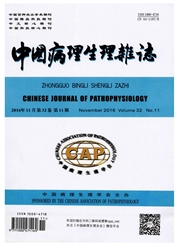

 中文摘要:
中文摘要:
目的:通过腺病毒介导的RNA干扰技术沉默一种新的脂联素(APN)受体T-cadherin的表达,并建立心肌细胞缺氧/复氧(H/R)模型,观察T-cadherin对H/R所致心肌细胞凋亡的影响。方法:选用原代培养72 h的心肌细胞进行实验,随机分为5组:(1)空白对照组:心肌细胞正常培养;(2)H/R组;(3)APN+H/R组;(4)Ad-T-cadherin-siRNA+APN+H/R组;(5)Ad-HK(腺病毒阴性对照)+APN+H/R组。首先,确定最适合的腺病毒感染滴度,RT-PCR和Western blotting检测腺病毒介导的干扰RNA对T-cadherin表达的影响效果;其次,通过流式细胞术和TUNEL检测心肌细胞的凋亡。结果:原代培养获得高纯度的乳鼠心肌细胞。腺病毒感染的最佳MOI值为100,48 h后腺病毒的感染效率和红色荧光蛋白表达最强,其效率高于90%。RT-PCR和Western blotting证实腺病毒介导的siRNA转染的心肌细胞T-cadherin mRNA和蛋白水平均明显下降(P〈0.05)。Ad-T-cadherin-siRNA+APN+H/R组心肌细胞凋亡率与APN+H/R组相比显著升高(P〈0.05),与H/R组相比差异无统计学意义(P〉0.05)。结论:重组腺病毒Ad-T-cadherin-siRNA能够在体外高效感染原代心肌细胞,并成功降低T-cadherin在心肌细胞的表达;低表达的T-cadherin阻断了脂联素对缺氧/复氧诱导的乳鼠心肌细胞凋亡的抑制作用。
 英文摘要:
英文摘要:
AIM: To investigate the mechanism of cardiomyocyte apoptosis induced by hypoxia/reoxygenation (H/R) by silencing a new adiponectin receptor T-cadherin through adenovirus-mediated RNA interference. METHODS: The primary cardiomyocytes were isolated from neonatal rats and cultured for 72 h. The cardiomyocytes were randomly di- vided into control group, H/R group, APN + I-I/R group, Ad-T-cadherin-siRNA + APN + H/R group and Ad-HK ( adeno- virus negative control) + APN + H/R group. The transfection ability and efficiency were examined. The expression of T- cadherin at mRNA and protein levels was detected by RT-PCR and Western blotting. The apoptotic rate was analyzed by flow cytometry and TUNEL. RESULTS : High purity of neonatal rat cardiomyocytes was obtained by primary culture. After 48 h, over 90% of myocardiocytes were infected at MOI = 100. The transfected myocardiocytes showed a low expression level of T-cadherin under normal physiological condition. Compared with APN + H/R group, the cell apoptotic rate signifi- cantly increased in Ad-T-cadherin-siRNA + APN + H/R group (P 〈 0.05). Compared with H/R group, the difference was not statistically significant ( P 〉 0. 05 ). CONCLUSION : Ad-T-cadherin-siRNA effectively infects myocardial cells in vitro and successfully reduces the expression of T-cadherin in myocardial cells. The inhibitory effect of adiponectin on H/R-in- duced cardiomyocyte apoptosis is attenuated by decreasing the expression of T-cadherin.
 同期刊论文项目
同期刊论文项目
 同项目期刊论文
同项目期刊论文
 期刊信息
期刊信息
